中考复习专题 情态动词
中考英语二轮复习 语法专题情态动词 (讲义)

初三英语中考二轮复习【语法专题】情态动词中考考点用法点睛(讲义)He can speak English.翻译:他可以说英语。
情态动词:在表达说话人的情感或态度的一类动词。
特点:1.情态动词不能单独做谓语,必须与其他动词一起构成谓语。
2.情态动词后必须跟动词原形。
3.情态动词具有助动词功能。
常见的情态动词can/could可以,能够may/might也许,可能;must必须/need需要/dare敢于/should应该/would打算He can speak English.他可以说英语。
表示能力,能够做某事。
She can swim fast.They can play basketball well.Lucy can help you with this.【be able to】能够做某事,can表示能力的时候,他们2者之间,能够相互替换She is able to swim fast.They are able to play basketball well.Lucy is able to help you with this.He could write poems when he was 10. 翻译:他十岁时会写诗。
过去能够做某事,用,could来将其替换He could write poems when he was 10. 他十岁时就会写诗。
I could swim when I was seven years old. 我七岁的时候会游泳。
Leo could run fast when he was young. 利奥年轻的时候跑得很快。
在疑问句当中could 作为引导词出现——表达委外语气,请求做某事。
Could I have a drink我可以喝一杯吗?肯定回答只能用——Yes,you can. Could we meet again next week下周我们可以再见面吗?——Yes,we can.Could I come to see you tomorrow明天我能来看您吗?——Yes, you can.This news can't be true.翻译:这个消息不可能是真的。
中考英语复习情态动词课件(共27张PPT).

ought to侧重于表示按照法律,法规等规 定,就强制意义的责任或义务。
should含有个人意见,强调主观看法,语 气比ought to稍弱。
had better
1. It’s raining outside, you’d better stay at home. 2. It’s very cold, you had better not go out.
may表示请求时,肯定回答用may, can;否定回答用mustn’t 或can’t。
二、表示义务类
1. Students must finish their homework before class. 2. I have to go now. 3. Children should learn to respect others. 4. I need type this letter before work. 5. I need to type this letter before work.
must:必须 have to: 不得不 should:应该 need:需要
need 需要(情态动词、实意动词) have to 不得不
三、表示能力类
1. I can draw. = I am able to draw. 2. I could ride a bike when I was six years old.
能,可能,应该, 必须,不得不,需要
最好,将要,可以
must表示肯定是,用于肯定句 can 表示可能,用于否定句,疑问句 may表示可能,用于肯定句
“肯定 是”
“不可 能是”
“可能 是”
对一般现 对现在进 对一般过 对过去进 在推测 行推测 去推测 行推测
中考英语专项提分复习专项 (九)—情态动词
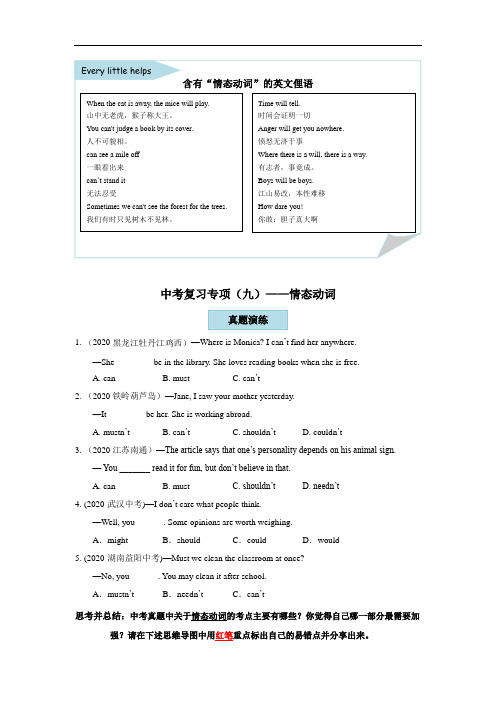
中考复习专项(九)——情态动词1.(2020黑龙江牡丹江鸡西)—Where is Monica? I can’t find her anywhere.—She ________ be in the library. She loves reading books when she is free.A. canB. mustC. can’t2.(2020铁岭葫芦岛)—Jane, I saw your mother yesterday.—It ________ be her. She is working abroad.A. mustn’tB. can’tC. shouldn’tD. couldn’t3.(2020江苏南通)—The article says that one’s personality depends on his animal sign.—You _______ read it for fun, but don’t believe in that.A. canB. mustC. shouldn’tD. needn’t4.(2020·武汉中考)—I don’t care what people think.—Well, you ______. Some opinions are worth weighing.A.might B.should C.could D.would5.(2020·湖南益阳中考)—Must we clean the classroom at once?—No, you ______. You may clean it after school.A.mustn’t B.needn’t C.can’t思考并总结:中考真题中关于情态动词的考点主要有哪些?你觉得自己哪一部分最需要加强?请在下述思维导图中用红笔重点标出自己的易错点并分享出来。
知识思维导图考点专练➢考点1:情态动词本意6.(2020·江苏连云港中考)If we don’t protect nature, some wildlife ______ die out in the future.A.need B.may C.can’t D.shouldn’t7.(2020攀枝花)—China is going to use AI to protect the Great Wall.—Great! AI is so helpful that people _____________use it in their daily life now.A. mustB. canC. shallD. have to8.(2020·湖北部分市中考)Oh! Mum, where’s my notebook? I ______ find it.A.can’t B.needn’t C.shouldn’t D.mustn’t9.(2020·江苏淮安中考)You ______ smoke here! Look at the sign. It says “No smoking”.A.needn’t B.mustn’t C.can D.may10.(2020·江苏徐州中考)Mother had a hard time getting Helen up in the morning. She called and called, but Helen ______ wake up.A.wouldn’t B.mustn’t C.needn’t D.shouldn’t11.(2020·辽宁营口中考)—Where are my keys? I’m afraid I lost them again.—Don’t worry! With the new lock, you ______ search for them any more.A.shouldn’t B.can’t C.mustn’t D.needn’t12.—Mun, can I do the homework tomorrow?—You finish it today.A.had betterB. have betterC. had better notD. had rather not13.—The room is do dirty. we clean it?—OK.A.WillB. ShallC. WouldD. Do14.There’s only one day to go. You finish your schoolwork by tomorrow.A.canB. willC. mustD. mayst year I drive. I used to take the bus.A.couldB. couldn’tC. shouldD. shouldn’t➢考点2:情态动词引导的一般疑问句16.(2020广西柳州)—Must I finish my homework now, Dad?—Yes, you ______.A. mayB. needC. must17.(2020·四川乐山中考)—______ we leave the library before 5 o’clock?—No, you needn’t. You can stay here until 5:30.A.Must B.May C.Can18.—Can we walk across the road now ?—No, we . We have to wait until the light turns green.A.couldn’tB. needn’tC. shouldn’tD. mustn’t➢考点3:情态动词表推测19.(2020·天津中考)I ______ be late, so don’t wait for me to start the meeting.A.mustn’t B.needn’t C.need D.may20.(2020·泰州中考)—In China,many students feel stressed because of too much homework. —Don’t worry. Our government has realized this problem. I’m sure there ______ be good news for them soon.A.can B.must C.should D.need21.(2020·江苏无锡中考)You ______ be able to control all the things that happen to you, but you can decide not to be reduced by them.A.need not B.may not C.must not D.should not22.(2020青海)—Lily is intelligent and hard-working, she ________ do well in the singing competition.—Sure. She was born to be a singer.A. shouldB. mightC. can’t23.(2020·辽宁抚顺本溪辽阳中考)I walked here today, so this bike ______ be mine.A.can B.mustn’t C.can’t D.must➢易混易错24.—Are you going to the cinema tonight?—I don’t know. I go or I stay at home.A.will; will B.must; must C.should; should D.might; might 25.—May I watch TV, Dad?—When your homework is finished, you .A.should B.can C.must D.need26.We pay to get into the concert. It’s free.A.can’t B.mustn’t C.might not D.don’t have to27.(2020·湖北咸宁中考)—Mum, it’s too hot. ______ I swim in the lake with my friends?—No, you______. That’s too dangerous!A.Could;mustn’t B.Need;couldn’tC.Must;needn’t D.Should;can’t28.—What it be?—It be a mail box, for it is moving. It be a car.A.can; can’t; mustB. can; can; mustC. can; mustn’t; mustD. must; mustn’t; can29.—Look, someone is coming. Guess .—Jack. He’s always on time.A.who can it beB. who he mayC. who he can beD. who it can be30.—May I use your camera this Sunday?—No, you .A.needn’t B.may not C.won’t D.mustn’t 31.—Would you like to go boating with us?—Yes, .A.I’d like B.I want C.I’d like to D.I do32.You to the meeting this afternoon if you have something important to do.A.needn’t to comeB. don’t need comeC. don’t need comingD. needn’t come33.—I take the newspaper away?—No, you mustn’t. You read it only here.A.Must; can B.May; can C.Need; must D.Must; must34.—Please don’t be late again. —Oh, sorry. I _______.A.can’tB. willC. mayD. won’t35.you continue in your efforts and achieve new and greater successes!A.MayB. CanC. HopeD. Will36.—I want to know if I smoke here.—No, you . Could you see the sign “NO SMOKING” on the wall?A.can; needn’tB. must; can’tC. shall; won’tD. can; mustn’t37.—Could I borrow your ruler?—Yes, of course you .A.willB. canC. couldD. may38.—Who is singing in the next room?—It be Lisa, but I’m not sure.A. mayB. mustC. needD. would39. I missed the last bus, so I go home on foot.A. mustB. have toC. mayD. had to40. (2020·苏州中考)—Mum, why do I have to wash hands so many times a day?—For your health, you ______ be too careful.A .can ’tB .shouldn ’tC .mustn ’tD .needn ’t根据文章大意,从方框中选择合适的词填入空中,注意选词的形式变换。
最新版-英语情态动词专项复习

we can see his name on it .
7
4. need (需要) 既可做实义动词也可做情态动词 1)实义动词 need to do sth 需要做某事
Eg: I need to buy a big house . --- Do you need to buy a big house ? --- Yes , I do . No, I don’t . He needs to borrow a map . --- Does he need to borrow a map ?
Yes ,you may. No, you mustn’t. No, you can’t.
Yes, you must. No, you needn’t. No you don’t have to
Yes, you must. No, you needn’t
1.Must I take the keyboard to the office now ?
2) 情态动词 need do sth 需要做某事 Eg: I need buy a big house .
8
5. have to
不得不
Eg: It’s eleven o’clock . I have to go now .
He has to finish the work first .
请注意: I don’t have to go now .
--No, you __C___.Tomorrow is Saturday .You
may get up later.
A mustn’t
情态动词(17张PPT)初中英语专项复习课件

表示需要、必须,主 要用于否定句和疑问 句中。needn’t常用 于回答must表请求的 否定回答
—Must I finish my homework now?我必 须现在完成我的家庭作 业吗? —No, you needn’t. 不, 你不需要。
注意 (1) must和have/has to均意为“必须”,常可互 换使用。但have/has to是用于强调客观需要,意为 “必须, 不得不”;must用于表示主观看法, 意为“ 必须, 应该”。如:We’ll have to ask Zhang Hong. 我们必须去问张红了。 We must work hard at school. 在学校我们必须 努力学习。
情态动词本身有一定的意义,但不能独立作谓语, 没有人称和数的变化,后面必须接动词原形。常见的情 态动词有:may, must, need, have to 等,具体用法见下表 :
情态动词
用法
例句
表示能力,意为 Sam can speak English well.
can “能,会”
山姆英语讲得很好。
He could have gone home. 他可能已回家了。
中考英语情态动词练习题50题含答案解析
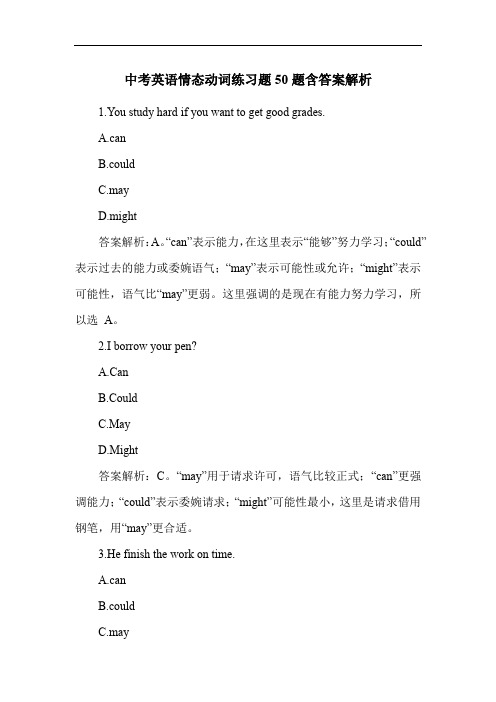
中考英语情态动词练习题50题含答案解析1.You study hard if you want to get good grades.A.canB.couldC.mayD.might答案解析:A。
“can”表示能力,在这里表示“能够”努力学习;“could”表示过去的能力或委婉语气;“may”表示可能性或允许;“might”表示可能性,语气比“may”更弱。
这里强调的是现在有能力努力学习,所以选A。
2.I borrow your pen?A.CanB.CouldC.MayD.Might答案解析:C。
“may”用于请求许可,语气比较正式;“can”更强调能力;“could”表示委婉请求;“might”可能性最小,这里是请求借用钢笔,用“may”更合适。
3.He finish the work on time.A.canB.couldC.may答案解析:A。
“can”表示能力,这里表示他有能力按时完成工作;“could”过去的能力或委婉语气;“may”表示可能性或允许;“might”可能性最小,这里强调能力,选A。
4. you help me with this problem?A.CanB.CouldC.MayD.Might答案解析:B。
“could”在这里表示委婉地请求帮助;“can”语气比较直接;“may”和“might”主要表示可能性和允许,不太符合语境。
5.She come to the party if she has time.A.canB.couldC.mayD.might答案解析:C。
“may”表示可能性,在这里表示她有可能来参加派对如果有时间;“can”表示能力;“could”过去的能力或委婉语气;“might”可能性比“may”更小。
6.We go to the park if it doesn't rain.A.canB.couldD.might答案解析:A。
“can”表示能够,这里表示如果不下雨我们能够去公园;“could”过去的能力或委婉语气;“may”表示可能性或允许;“might”可能性最小。
中考(完整版)英语情态动词专项练习附解析含答案
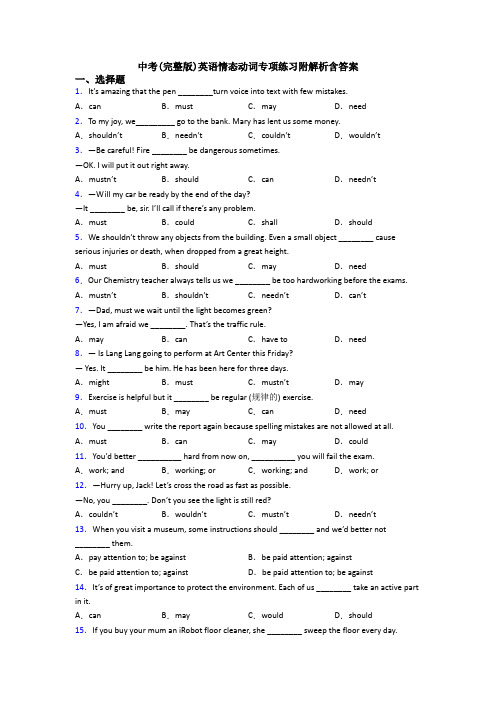
中考(完整版)英语情态动词专项练习附解析含答案一、选择题1.It’s amazing that the pen ________turn voice into text with few mistakes.A.can B.must C.may D.need2.To my joy, we_________ go to the bank. Mary has lent us some money.A.shouldn’t B.needn’t C.couldn’t D.wouldn’t3.—Be careful! Fire ________ be dangerous sometimes.—OK. I will put it out right away.A.mustn’t B.should C.can D.needn’t4.—Will my car be ready by the end of the day?—It ________ be, sir. I’ll call if there’s any problem.A.must B.could C.shall D.should5.We sh ouldn’t throw any objects from the building. Even a small object ________ cause serious injuries or death, when dropped from a great height.A.must B.should C.may D.need6.Our Chemistry teacher always tells us we ________ be too hardworking before the exams. A.mustn’t B.shouldn’t C.needn’t D.can’t 7.—Dad, must we wait until the light becomes green?—Yes, I am afraid we ________. That’s the traffic rule.A.may B.can C.have to D.need8.— Is Lang Lang going to perform at Art Center this Friday?— Yes. It ________ be him. He has been here for three days.A.might B.must C.mustn’t D.may 9.Exercise is helpful but it ________ be regular (规律的) exercise.A.must B.may C.can D.need10.You ________ write the report again because spelling mistakes are not allowed at all. A.must B.can C.may D.could11.You'd better __________ hard from now on, __________ you will fail the exam. A.work; and B.working; or C.working; and D.work; or 12.—Hurry up, Jack! Let’s cross the road as fast as possible.—No, you ________. Don’t you see t he light is still red?A.couldn’t B.wouldn’t C.mustn’t D.needn’t 13.When you visit a museum, some instructions should ________ and we’d better not________ them.A.pay attention to; be against B.be paid attention; againstC.be paid attention to; against D.be paid attention to; be against14.It’s of great importance to protect the environment. Each of us ________ take an active part in it.A.can B.may C.would D.should15.If you buy your mum an iRobot floor cleaner, she ________ sweep the floor every day.A.c an’t B.mustn’t C.needn’t D.shouldn’t 16.—Have you decided to take up teaching as career after graduation?—I ________ go abroad for further education instead. But it depends.A.must B.should C.may D.shall17.The boy is very brave.I ________ he ________ the tall tree.A.dare say; dares to climbB.dare to say; dare climbingC.dare saying; dares climbD.dare to say; dares climbed18.---Will you be back early this evening?---Yes, but I ________ be a little late. Our boss sometimes has extra work for us.A.may B.must C.need D.will19.We’ve discussed every detail of this plan and have got everything ready. But still something __________ go wrong. We still have to be very careful.A.must B.should C.would D.may 20.—Amy, I hear you've got many foreign coins._______ I have a look?—Of course, I'll fetch them for you.A.May B.MustC.Should D.Need21.My bike was broken yesterday,so I____walk home.A.might B.had to C.must D.could 22.—Would you please________in that way? That’s not safe!—Sorry. I won’t do it any more.A.not driving B.not to drive C.no driving D.not drive 23.Dr. Zhong Nanshan once said, "To prevent the spread of this disease, we________never be too careful."A.can B.may C.must D.should 24.Don’t cross the road until the traffic lights turn green. A car_______hit you.A.need B.may C.should D.must 25.—Where is Tom? I am considering ________ him about the result of the exam.—Oh. You ________. He has known it already.A.to tell; can't B.telling; needn't C.tell; mustn't D.told; shouldn't 26.You ________ pay too much attention to protecting yourself if you plan to go abroad. A.mustn’t B.can’t C.shouldn’t D.needn’t27.To avoid ________, we’d better ________ the parents’ meeting online.A.gather; hold B.gathering; hold C.gather; holding D.to gather; to hold 28.You ________ require others to do with the problem like you. Everyone has his own way. A.mustn’t B.needn’t C.may not D.shouldn’t 29.—How do you like my new dress?—Well, if I ________ say, it is not suitable for you.A.may B.must C.have to D.should 30.—Must the children leave at six tomorrow morning?—No, they _______. They can have more time to get ready for the trip.A.can’t B.needn’t C.mustn’t D.may not 31.—Mum, why do I have to wear a mask before entering the supermarket?—For your health and safety, you ________ be too careful.A.shouldn’t B.can’t C.mustn’t D.needn’t 32.According to the rule, used batteries ________ be dropped in the red bin for harmful wastes. A.may B.would C.should D.might33.You _________ smoke here! Look at the sign. It says "No smoking".A.needn't B.mustn't C.can D.may34.— Listen! Tom ________ be listening to the music while doing his homework.—Let’s go upstairs to remind him to turn it off.A.should B.could C.would D.must35.—Is that Mr Zhou?—It ________ be him. He has gone to Beijing.A.can B.may C.can’t D.shouldn’t 36.Never throw objects from the building. Even a small object ________ cause serious injuries, or death, when dropped from a great height.A.must B.should C.may D.need37.—The high school entrance examination is coming!— Yes, our teacher tells us we ________ be too careful while taking exams.A.mustn’t B.shouldn’t C.needn’t D.can’t38.— Is the boy over there Tom? He often wears a jacket like that.— It _______ be him. He is absent from school today.A.needn’t B.shou ldn’t C.mustn’t D.can’t39.—Is it really necessary for me to go shopping with a mask on?—I’m afraid you ________ in public. It is not only to protect yourself but also to protect others. A.must B.should C.can D.need40.Look at the floor, Tom! ________ you watch TV while having a meal?A.Should B.Could C.Must D.May41.Cars ________ give way to walkers on some roads in Binhai, or the drivers will be fined. A.may B.will C.can D.must 42.Sometimes smiles ________ be false, hiding other feelings like anger, fear or worry. A.should B.would C.must D.can43.—Could you tell me how to renew the library books?—With pleasure. You ________ come to our desk every time. It’s easier to renew them online. A.can’t B.mustn’t C.needn’t D.shouldn’t44.For the safety of the passengers, objects like guns ________ be carried on board.A.may not B.needn’t C.might not D.mustn’t 45.—The article says that a person’s animal sign decides his personality.—You ________ read it for fun, but don’t believe in that.A.can B.must C.shouldn’t D.needn’t 46.—How beautiful the winter jasmines (迎春花) are!—Yes. These golden-yellow flowers ________ be widely seen in my city in March.A.must B.can C.would D.should 47.—Mum, I bought some strawberries on my way home.—Oh, you’re so sweet. But the strawbe rries ________ be put into the fridge for freshness. A.must B.can C.may D.need48.— What do you think of the show yesterday?— Some of them were really good but others ________ be better.A.will B.must C.need D.can49.—May I have some wine to drink?—No, you ________. You have to drive home later.A.mustn’t B.needn’t C.can’t D.may not 50.—Will Jim come to Yangzhou for a holiday?—He ________come and it depends on how much homework he will have.A.may B.should C.must D.need【参考答案】***试卷处理标记,请不要删除一、选择题1.A解析:A【详解】句意:神奇的是,这支笔能把声音转换成文字,而且很少出错。
中考英语情态动词练习题40题
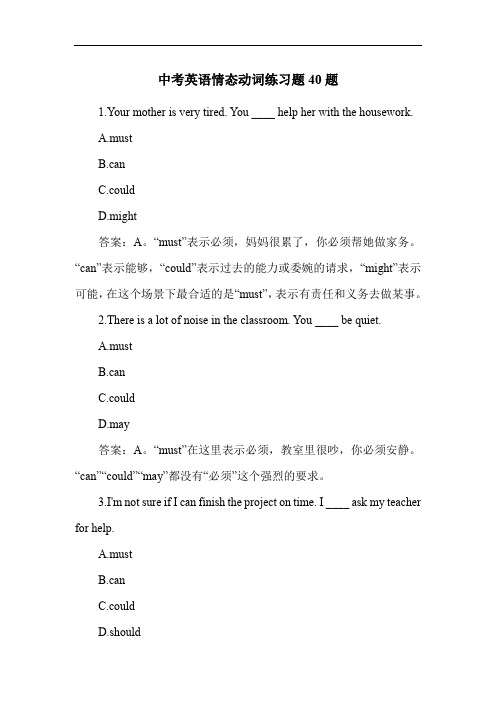
中考英语情态动词练习题40题1.Your mother is very tired. You ____ help her with the housework.A.mustB.canC.couldD.might答案:A。
“must”表示必须,妈妈很累了,你必须帮她做家务。
“can”表示能够,“could”表示过去的能力或委婉的请求,“might”表示可能,在这个场景下最合适的是“must”,表示有责任和义务去做某事。
2.There is a lot of noise in the classroom. You ____ be quiet.A.mustB.canC.couldD.may答案:A。
“must”在这里表示必须,教室里很吵,你必须安静。
“can”“could”“may”都没有“必须”这个强烈的要求。
3.I'm not sure if I can finish the project on time. I ____ ask my teacher for help.A.mustB.canC.couldD.should答案:C。
“could”表示委婉的请求或可能性,不确定能否按时完成项目,可以委婉地请求老师帮助。
“must”语气太强硬,“can”表示能力,“should”表示应该,在这个场景下“could”最合适。
4.You ____ play football in the street. It's very dangerous.A.mustn'tB.can'tC.couldn'tD.mightn't答案:A。
“mustn't”表示禁止,在街上踢足球很危险,所以是禁止的。
“can't”“couldn't”“mightn't”都没有“禁止”这个强烈的意思。
5.I have a lot of homework to do. I ____ watch TV tonight.A.mustn'tB.can'tC.couldn'tD.may not答案:B。
中考英语情态动词练习题40题
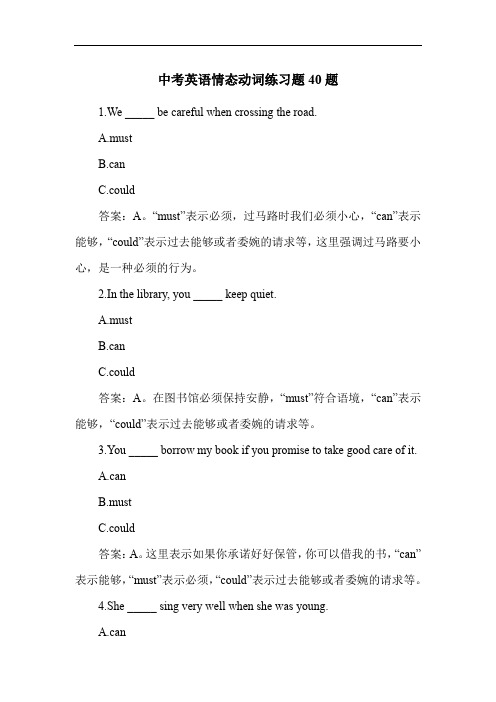
中考英语情态动词练习题40题1.We _____ be careful when crossing the road.A.mustB.canC.could答案:A。
“must”表示必须,过马路时我们必须小心,“can”表示能够,“could”表示过去能够或者委婉的请求等,这里强调过马路要小心,是一种必须的行为。
2.In the library, you _____ keep quiet.A.mustB.canC.could答案:A。
在图书馆必须保持安静,“must”符合语境,“can”表示能够,“could”表示过去能够或者委婉的请求等。
3.You _____ borrow my book if you promise to take good care of it.A.canB.mustC.could答案:A。
这里表示如果你承诺好好保管,你可以借我的书,“can”表示能够,“must”表示必须,“could”表示过去能够或者委婉的请求等。
4.She _____ sing very well when she was young.A.canB.couldC.must答案:B。
表示她年轻时能够唱歌很好,“could”表示过去能够,“can”表示现在能够,“must”表示必须。
5.We _____ finish our homework on time.A.mustB.canC.could答案:A。
我们必须按时完成作业,“must”符合语境,“can”表示能够,“could”表示过去能够或者委婉的请求等。
6.You _____ come to my party if you are free.A.canB.mustC.could答案:A。
如果你有空,你可以来我的派对,“can”表示能够,“must”表示必须,“could”表示过去能够或者委婉的请求等。
7.He _____ swim when he was five years old.A.canB.couldC.must答案:B。
100例:初中九年级中考英语情态动词专项练习附答案
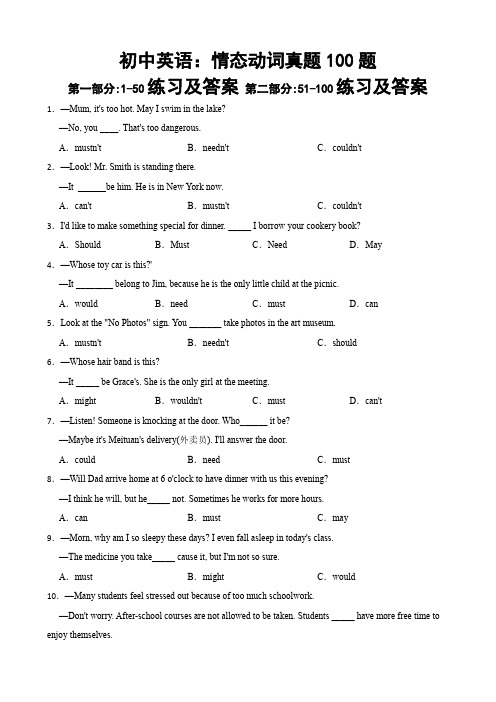
初中英语:情态动词真题100题第一部分:1-50练习及答案第二部分:51-100练习及答案1.—Mum, it's too hot. May I swim in the lake?—No, you ____. That's too dangerous.A.mustn't B.needn't C.couldn't2.—Look! Mr. Smith is standing there.—It be him. He is in New York now.A.can't B.mustn't C.couldn't3.I'd like to make something special for dinner. _____ I borrow your cookery book?A.Should B.Must C.Need D.May 4.—Whose toy car is this?'—It ________ belong to Jim, because he is the only little child at the picnic.A.would B.need C.must D.can5.Look at the "No Photos" sign. You _______ take photos in the art museum.A.mustn't B.needn't C.should6.—Whose hair band is this?—It _____ be Grace's. She is the only girl at the meeting.A.might B.wouldn't C.must D.can't7.—Listen! Someone is knocking at the door. Who______ it be?—Maybe it's Meituan's delivery(外卖员). I'll answer the door.A.could B.need C.must8.—Will Dad arrive home at 6 o'clock to have dinner with us this evening?—I think he will, but he_____ not. Sometimes he works for more hours.A.can B.must C.may9.—Morn, why am I so sleepy these days? I even fall asleep in today's class.—The medicine you take_____ cause it, but I'm not so sure.A.must B.might C.would10.—Many students feel stressed out because of too much schoolwork.—Don't worry. After-school courses are not allowed to be taken. Students _____ have more free time to enjoy themselves.A.can B.have to C.needed11.—A 14-year-old girl, Quan Hongchan, won at the 2020 Tokyo Olympics.—Nothing _____ without hard work. It took much effort for Quan to learn skills.A.can achieve B.will achieve C.will be achieved 12.—Where's Jack? His phone's out of service.—He_____ be on the ground floor. The phone can't get signal(信号) there.A.must B.can't C.might13.—Is it really necessary for me to go shopping with a mask(口罩)on?—I'm afraid you_____ in public. It's not only to protect yourself but also to protect others.A.should B.can C.must14.—_____ I have two tickets for the Chinese Farmers' Painting Exhibition?—Sorry. The tickets have been sold out.A.Must B.Need C.May15.—Who is playing the piano in the music room? Is it Mary?—No, it ___________be her. She has ___________to Beijing on business.A.couldn't; been B.can't; goneC.can't; been D.mustn't; gone16.—Whose physics book is this?—It _____be Helen's because her name is on it.A.mustn't B.must C.might D.can't 17.—David, do you know Su Yiming, a snowboarder from China?—Sure. He won the first place in the men's Big Air Event. He_____________ be hard-working.A.needn't B.can't C.should D.must 18.The boy ________ be Tom. I saw him reading in the library just now.A.shouldn't B.can't C.needn't19.— Mike, I can't stop playing computer games.— For your eyes, my dear friend, I'm afraid you____.A.could B.may C.would D.have to 20.—I can't find my dictionary. ________ I use yours?—Sure, here you are.A.Need B.May C.Must D.Should21.—_________ I take photos here?—Sorry, you can't. It's not allowed in the museum.A.Must B.Need C.Can D.Will22.To achieve our dream, we ________ rest on what we have done.A.may not B.should not C.need not D.could not23.—I don't care what Kate thinks.—Well, you _______. Her suggestions are of some value.A.would B.should C.might D.could 24.—Whose English book is this?—It _______ be Lily's, but I'm not sure.A.might B.can't C.must25.You ________ drive without a license!A.can B.must C.mustn't D.may26.When our parents become too old to take care of themselves one day, they __________ be looked after well by us.A.should B.shouldn't C.may D.may not 27.—Excuse me. _______ I sit here?—You'd better not. It's the man's seat.A.Must B.Need C.Could D.Should28.We should learn some basic life skills since we ________ depend on ourselves some day.A.can B.can't C.must D.mustn't 29.—Can we play games here?—Better not. If you ________, please go to the open space there.A.must B.can C.may D.will30.—The paper cutting is pretty lively, who made it?—It ________ be Amy. None of us except her is able to do it.A.would B.need C.must D.can31.— ________ you tell us a story in English?—I think I can do it. Let me try.A.Need B.Can C.Should D.Must32.—Look! Mark is reading a book in the library.—It ______ be him. He is in the classroom.A.can't B.wouldn't C.needn't33.—Listen! I think it ________ be Mrs. Li singing in the next room.— It ________ be her. I know she has already left for New York.A.may, must B.must, can't C.must, mustn't 34.—Whose is this toy truck?—It _________ belong to Dick. He was the only little kid at the picnic.A.can't B.must C.could D.need 35.—What kind of music do you like?—I like music that I ______ dance to.A.can B.must C.should D.need 36.—Alex, come down to play football.—I can't. Mom said I __________ clean my bedroom before doing anything else.A.had to B.will C.used to D.can37.The book ______ be Mary's. We can see her name on it.A.need B.must C.can't D.needn't 38.—To make our school more beautiful, we _____throw the rubbish on the ground.—Everyone should play an important part in doing it.A.needn't B.mustn't C.may not39.Jim can swim, but I________.A.don't B.can't C.am not40.—Wow! Here is an offer of Tsinghua University! _______it be Bob's?—It must be Bob's, he is the most excellent student in our school.A.May B.Can C.Must D.Shall41.You ________ pay too much attention to your reading skill as it's very important.A.shouldn't B.needn't C.mustn't D.can't 42.—Have you decided how to spend this weekend with your family, Lingling?—Not yet. We ____ go camping along Nanxi River to enjoy beautiful sights.A.must B.should C.need D.may43.— No one knows what it will be like tomorrow because there are many possibilities such diseases, disasters(灾难) and so on.— Yeah, but sometimes the facts show that humans stronger than the forces of nature.A.can't be B.can be C.mustn't be 44.The girl in the classroom ____ be Maria. She called me from the library just now.A.mustn't B.may not C.can't D.needn't 45.—Could you tell me how to renew the library books?一With pleasure. You________ come to our desk every time. It's easier to renew them online.A.can't B.mustn't C.shouldn't D.needn't 46.—Mom, can I watch TV this evening?—You ________ finish your homework first.A.can B.may C.must D.shall 47.— Whose toy car is this?—It be Sally's. She's the only little kid at the dinner party.A.should B.must C.might D.can't 48.—A country has dreams. We teenagers also have dreams.—With dreams and hard work, anything amazing can be created.A.should B.may C.must D.can 49.—Is that Li Ming over there?—It___ be him. He is working as a volunteer in Henan.A.can't B.mustn't C.must 50.—Some Chinese scientist are now doing research on sea rice.—If farmers__________ start planting rice in salty water, Chinese food supply will surely rise.A.can B.can't C.must D.mustn't答案解析部分1.A2.A3.D4.C5.A6.C7.A8.C9.B10.A11.C12.A13.C14.C15.B16.B17.D18.B19.D20.B21.C22.B23.B24.A25.C 26.A 27.C 28.C 29.A 30.C 31.B 32.A 33.B 34.B 35.A 36.A 37.B 38.B 39.B 40.C 41.D 42.D 43.A 44.C 45.D 46.C 47.B 48.A 49.A 50.A第二部分:51-100练习及答案1.—Someone is knocking at the door. Maybe Peter has come.—It be Peter because he has gone to New Zealand.A.can't B.may C.mustn't D.shall 2.—Mr. Wang, must I come again to clean the classroom on Sunday?—No, you . I have asked Kate to do it.A.can't B.mustn't C.needn't D.shouldn't 3.—________I return the book today, Mr. Lin?—No, you ________. You can keep it for two days.A.May; mustn't B.Must; mustn'tC.Must; needn't D.Can; shouldn't4.—Do you have any plans for the coming summer holidays?—I take part in some volunteering activities. I haven't decided.A.need B.may C.must D.could 5.—Must I go to Nanyang Square this afternoon to see him?— No, you . You can wait for his call.A.mustn't B.can't C.needn't D.shouldn't 6.—Jack must be in his office, I think.—No, he be in the office. He flew to Canada this morning.A.needn't B.shouldn't C.can't D.mustn't 7.— Is it Jay who didn't hand in the history homework this morning?— No, it ________ be Jay. History is his favourite subject.A.can't B.needn't C.shouldn't D.mustn't 8.—Tom, we play King of Glory(王者荣耀) together this weekend?—I'm afraid not. There is too much homework to do. We finish it on time.A.shall; can't B.may; must C.shall; should D.can; will 9.—Must I go to medical school and be a doctor like you, Dad?—No, you ________, son. You're free to make your own decision.A.can't B.shouldn't C.needn't D.mustn't 10.—Life is becoming convenient with the Internet.—That's true! Almost everything ______ be done online.11.—Dad, I've signed for the box. What's in it?—I'm not sure. It _____ be a present from your uncle.A.need B.must C.may D.will 12.—Sixty dollars for such a T-shirt! You be joking!—I'm serious. It's made of silk from Hangzhou.A.must B.need C.will D.can 13.— Mum, may I go swimming now?—Yes, dear, but remember that you ___________go with your dad.A.may B.can C.must D.should 14.—Could I invite my friends to our party on Sunday, mom?—Of course you _____. That sounds great.A.may B.can C.could D.must 15.— Hi, Tom! Is this new red bike Tim's? He told me he bought a new one.— It _______ be Tim's. He never buys things in red.A.can B.must C.can't D.mustn't 16.I love the weekend because I _______ get up early to go to school.A.can't B.mustn't C.needn't D.shouldn't 17.—Look! It _____ be John on the playground.—It_____ be him. I saw him in the classroom just now.A.may, mustn't B.must, can't C.can can't D.mustn't, can 18.—Mum, must I finish my homework today?—________. You may do it tomorrow morning.A.No, you mustn't B.No, you needn't C.Yes, you must 19.—I missed last night's Everlasting Classics(《经典咏流传》)!—You care. You can watch it online later.A.mustn't B.can't C.may not D.needn't 20.He _________ work on the farm every day. I'm sure about that because his skin is very black.A.can't B.may C.must D.couldn't 21.— Mom, I eat the sandwiches now ?— No. You must set the table first.22.— Mom, must I wash the clothes now?— No, you . You wash them in the afternoon.A.mustn't; must B.needn't; must C.mustn't; can D.needn't; can 23.—Whose is the notebook?—It ________ be Mary's. Look at her name on the cover.A.can B.may C.must D.need24.—Why don't you stay a little longer?—Sorry, I . I have to meet my uncle at the airport.A.must B.should C.needn't D.can't 25.Parents encourage their children to take part in volunteer work. It will have a good influence on themA.should B.mustn't C.might D.can't 26.—Listen! Is Millie playing the violin in the music room?—No. It be her. She has gone to the teachers' office.A.should B.must C.needn't D.can't27.You be tired after walking for such a long time. Sit down and have a rest.A.can B.can't C.mustn't D.must28.—Look! Is the man wearing a white shirt your father?—No, it ________be him. He is picking up my sister at the airport.A.may B.must C.can't D.mustn't29.—________ you leave now? You only arrived here an hour ago.—Sorry, but so much homework is waiting for me.A.May B.Must C.Can D.Might30.The magazines on the bookshelf are free for students. You keep one if you like.A.need B.must C.can D.should 31.Children under 12 years of age in that country go together with their parents when in a public library.A.must B.may C.can D.need32.—Who it be that is knocking at the door?—It be father, but I'm not sure.A.call; must B.can; may C.must; can D.may; must 33.—Lucy doesn't mind lending you her bike.—She , I've already borrowed one.A.can't B.mustn't C.needn't D.shouldn't 34.—Is there a flight to Paris this evening?—There be. I'll phone the airport and find it out.A.must B.would C.might D.can 35.—Must I stay here with you?—No, you . You may go home, but you go to the net bar(网吧).A.mustn't; needn't B.needn't; mustn'tC.must; need D.need; must36.—It's so late. Our son be back!—Don't worry. I dare say he have some extra work to do.A.can; must B.will; might C.should; must D.must; may 37.Marie witnessed everything but it is amazing that she have say nothing about the murder.A.can B.may C.must D.should 38.—Listen! Someone is singing in the next room. Who it be? Is it Linda?—No, it be her. She is at school now.A.may, can't B.must, mustn't C.will, may not D.may, won't 39.I'm feeling much better now so you ______ call the doctor.A.couldn't B.wouldn't C.can't D.needn't 40.—I'm a little tired. Let's go shopping by taxi.—We ______take a taxi. It's not far from here.A.mustn't B.couldn't C.needn't D.can't41.If you study harder, you will______ go to college.A.be able B.can C.be able to D.able to 42.When traffic lights are red, we stop and wait.A.should B.must C.need D.can 43.—Joe, what are you looking for?—My model plane. I ________ find it because it is a gift from my dearest grandpa.A.would B.must C.could D.can44.—What are you doing this weekend?—I'm not sure, but I ________go to Daming Lake.A.might B.must C.should D.need 45.— ____ I play computer games now, Mom?— No. You ______. You have to finish your homework first.A.May; mustn't B.Can; couldn't C.May; could D.Can; may not 46.— Someone is knocking at the door. Is it Ann? I've been waiting for her so long.—I'm sorry, it _____ be her. I saw her staying at school half an hour ago.A.may not B.shouldn't C.can't D.mustn't 47.— Excuse me, could you help me check if _________ tomorrow?— Ok. If you _____.A.the game will take place; mustB.the game is going to take place; needC.the game takes place; shouldD.the game is taking place; must48.—Marcus, could I have a look at your new mobile phone?—Of course you . Here you are.A.may B.could C.must D.can 49.—Can't you stay a little longer?—It's getting late I go now. My daughter is home alone。
中考英语情态动词考点总结与归纳
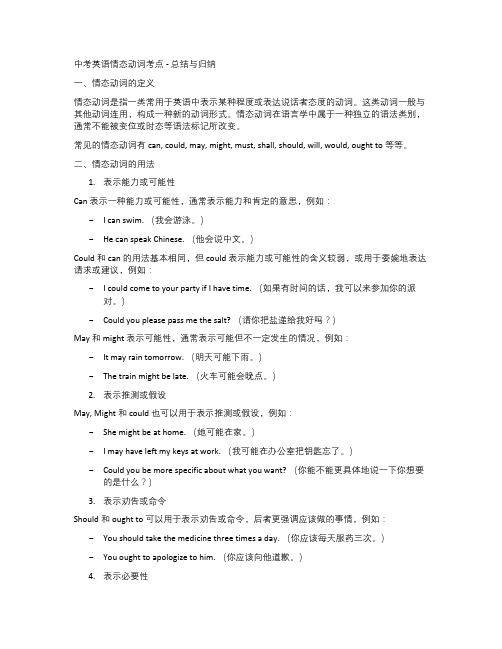
中考英语情态动词考点 - 总结与归纳一、情态动词的定义情态动词是指一类常用于英语中表示某种程度或表达说话者态度的动词。
这类动词一般与其他动词连用,构成一种新的动词形式。
情态动词在语言学中属于一种独立的语法类别,通常不能被变位或时态等语法标记所改变。
常见的情态动词有 can, could, may, might, must, shall, should, will, would, ought to 等等。
二、情态动词的用法1.表示能力或可能性Can 表示一种能力或可能性,通常表示能力和肯定的意思,例如:-I can swim. (我会游泳。
)-He can speak Chinese. (他会说中文。
)Could 和 can 的用法基本相同,但 could 表示能力或可能性的含义较弱,或用于委婉地表达请求或建议,例如:-I could come to your party if I have time. (如果有时间的话,我可以来参加你的派对。
)-Could you please pass me the salt? (请你把盐递给我好吗?)May 和 might 表示可能性,通常表示可能但不一定发生的情况,例如:-It may rain tomorrow. (明天可能下雨。
)-The train might be late. (火车可能会晚点。
)2.表示推测或假设May, Might 和 could 也可以用于表示推测或假设,例如:-She might be at home. (她可能在家。
)-I may have left my keys at work. (我可能在办公室把钥匙忘了。
)-Could you be more specific about what you want? (你能不能更具体地说一下你想要的是什么?)3.表示劝告或命令Should 和 ought to 可以用于表示劝告或命令,后者更强调应该做的事情,例如:-You should take the medicine three times a day. (你应该每天服药三次。
中考情态动词专题练习带答案
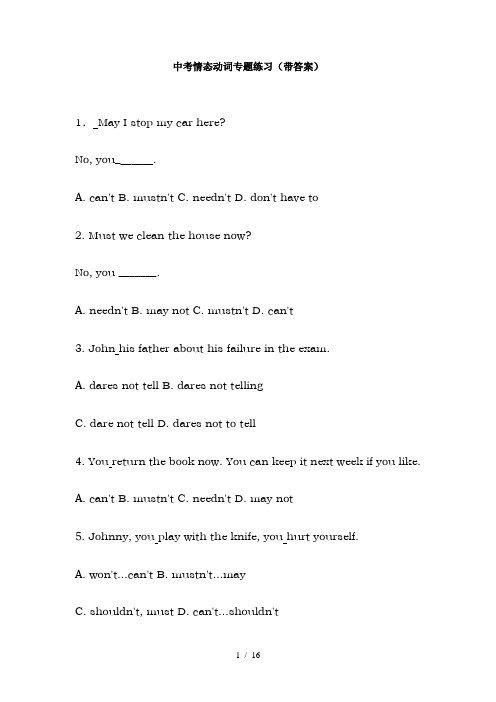
中考情态动词专题练习(带答案)1.May I stop my car here?No, you____.A. can'tB. mustn'tC. needn'tD. don't have to2. Must we clean the house now?No, you _______.A. needn'tB. may notC. mustn'tD. can't3. John his father about his failure in the exam.A. dares not tellB. dares not tellingC. dare not tellD. dares not to tell4. You return the book now. You can keep it next week if you like.A. can'tB. mustn'tC. needn'tD. may not5. Johnny, you play with the knife, you hurt yourself.A. won't...can'tB. mustn't...mayC. shouldn't, mustD. can't...shouldn't6. The fire spread through the hotel very quickly but everyone get out.A. had toB. wouldC. couldD. was able to7. Would you go out for a walk with me?No, I . My girl friend is coming.A. wouldn'tB. shall notC. won'tD. shouldn't8. Man die without water.A. willB. canC. needD. shall9. If he started at 9 0'clock, he be there by now.A. needB. shallC. ought toD. must10. I mailed the letter two weeks ago. She_____it.A. must receiveB. can't receiveC. might receiveD. must have received11.The professor gave orders that the experiment before 5:30p.m.A. be finishedB. will finishC. must be finishedD. would be finished12. There was plenty of time. You_____.A. mustn't hurryB. mustn't have hurriedC. needn't hurryD. needn't have hurried13. Tom was a diligent boy. He go to school though it was raining hard.A.was able toB. couldC. couldn'tD. wasn't able to14. ______I go back before lunch?No, I don't think you________.A. Need...mustB. Do...need toC. Must...have toD. May .... ought to15. The teacher do all the exercises, but a pupil_______.A. needn't....mustB. may not...mustC. needn't....needn'tD. can't....must16. Would you open the window please ?Yes, I______.A. willB. wouldC. doD. can17. A lion only attacks a human being when it is hungry.A. shouldB. canC. willD. shall18. ____Must I finish this novel this morning ?____No, you_____.A. mustn'tB. might notC. don't have toD. can't19. The taxi ____ only hold six passengers. It is full. You take the next one.A. may...mayB. can...mayC. may...canD. must...can20. I a little earlier, but I met a friend of mine on the way.A. may comeB. may have comeC. could have comeD. must have come21. I wish to go home now, I?A. mayB. can'tC. mustD. do22. He must have finished his homework, he?A. mustn'tB. didn'tC. needn'tD. hasn't23. This pen looks like mine, yet it isn't. Whose it be?A. mustB. canC. mayD. might24. He didn't do well in the exam. He hard at his lessons.A. must have workedB. ought to have workedC. would have workedD. has worked25. I wonder how he that to the teacher.A. dare to sayB. dare sayingC. not dare sayD. dared say26. Mr Baker, a number of students want to see you. _____ they wait here or outside?A. ShouldB. WillC. ShallD. Are27. You the trees. Look, it is raining now.A. mustn't have wateredB. needn't have wateredC. could have wateredD. might have watered28. I give you an answer tomorrow. I promise!A. mustB. willC. mayD. shall29. As a soldier, you do as the head tells you.A. willB. shallC. mayD. ought30. The streets are all dry. It_____ during the night.A. can't have rainedB. must have rainedC. couldn't rainD. shouldn't have rained31. "When _____ he leave the hospital?" I asked the doctor.A. willB. shallC. canD. may32. They have not finish the work up to now.____Well, they ______A. should haveB. shouldC. ought toD. ought have33. Since it is already midnight, we______.A. had better leavingB. ought to have leaveC. should take our leaveD. might as well leave34. you be happy!A. MayB. CanC. MustD. Would35. Must we come tomorrow?A. No, you can'tB. No, you needn'tC. No, you mustn'tD. No, you may not36. You miss the lesson, though we have it on Thursday.A. mustn't...needn'tB. needn't....mustn'tC. mustn't...mustn'tD. needn't...needn't37. To succeed in a difficult task,_____.A. one needs to work hardB. to work hard is neededC. you need be a hard working personD. to work hard is what one needs38. In case I______, I would try again.A. will failB. would missC. should failD. shall miss39. Some people feel that handguns______.A. should controlB. should be controlledC. must be controllingD. can be control40. ______ open the door for you ?A. Would you like that IB. Do you want that IC. Will ID. Shall I41. My son ____ the examination, but he wasn't careful enough.A. might be able to passB. must have passedC. could have passedD. were able to pass42. Isn't it strange that the lazy boy pass the exam?A. shouldB. hasC. mightD. would43. We the work so early without your help.A. couldn't finishB. can't finishC. couldn't have finishedD. can't have finished44. We the manager, but no one _____ his telephone number.A. could have called, knewB. could have called, had knownC. could call, had knownD. could call, knew45. "Would you come and join them?""I wish I . But I am busy at this moment.A. can'tB. couldn'tC. couldD. can46. If Alice this afternoon, the meeting should be put off.A. would not comeB. might not comeC. should not comeD. could not come47. I didn't see her in the meeting room this morning. She at the meeting.A. mustn't have spokenB. shouldn't have spokenC. needn't have spokenD. couldn't have spoken48. With so much work on hand, you to see the game last night.A. mustn't goB. shouldn't goC. couldn't have goneD. shouldn't have gone49. I thought you like something to read, so I have brought you some books.A. mayB. mightC. couldD. must50. There was plenty of time. She______.A. mustn't have hurriedB. couldn't have hurriedC. must not hurryD. needn't have hurried51. It's still early, you______.A. mustn't hurryB. wouldn't hurryC. may not hurryD. don't have to hurry52. Please open the window,________?A. can't youB. aren't youC. do youD. will you53. We for her because she never came.A. mustn't have waitedB. shouldn't have waitedC. mustn't waitD. needn't wait54. May I stop here?No, you ____.A. mustn'tB. might notC. needn'tD. won't55. He _____ you more help, even though he was very busy.A. might have givenB. might giveC. may have givenD. may give56. I didn't see her in the meeting room this morning.She at the meeting.A. mustn't have spokenB. shouldn't have spokenC: needn't have spoken D. couldn't have spoken57. Could I borrow your dictionary?Yes, of course you______.A. mightB. willC. canD. should58. Please don't make a noise.. I'll be as quiet as a mouse.A. Yes, I won'tB. No, I won'tC. No, I willD. Yes, I will59. The young man has made so much noise that he not have been allowed to attend theconcert.A. couldB. mustC. wouldD. should60. One ought for what one has done.A. not to be punishedB. to not be punishedC. to not punishedD. not be punished61. If you really want yourself to be in good health, you must always so much..A. not, be smokingB. not, have smokedC. not, to smokeD. be not, smoking62. Where is Mary?She isn't here. I think she_____.A. may have gone homeB. must have gone homeC. might have gone homeD. All the above63. I think Helen is at home.No, she be at home, for she phoned me from the airport just five minutes ago.A. mustn'tB. needn'tC. can'tD. dared not64. She is already two hours late. What to her?A. can have happenedB. may have happenedC. should have happenedD. must happen65. “he be watching TV now?”"Yes, he be watching TV now?""No, he be watching TV now."A. Must, can, mustn'tB. Can ,must, can'tC. Can, can, mustn'tD. May, must, needn't66. You must be a writer, ______?A. mustn't youB. are youC. must youD. aren't you67. You must have seen him last night, ?A. haven't youB. didn't youC. don't youD. must you68. I got up early this morning, but I _______so because I had no work to do.A. mustn't have doneB. didn't need to doC. needn't have doneD. can't have done69. Let's say that you could go there again, how feel?A. will youB. should youC. would youD. do you70. I daren't tell you what he did for fear that he angry with.A. will beB. isC. wasD. should be71. Without the leadership of the Party, there no New China.A. would beB. has beenC. wasD. should be72. It is necessary that we a foreign language.A. must masterB. ought to masterC. masterD. should master73. Most of the students felt rather disappointed at theEnglish party. They say that it ___ better organized.A. had beenB. had to beC. must have beenD. could have been74. I am surprised that he to help me when I needed it most.A. should refuseB. would have refusedC. should have refused toD. may have refused75. Look! Tom is too sleepy to work .He __ up watching TV.A. mustn't have stayedB. shouldn't have stayedC. mustn't stayD. ought not to say.练习题答案1-10 BACCB DCADD11-20 ADACA ACCBC21-30 ADBBD CBBBA31-40 BADAB AACBD41-50 CACAC CDDBD51-60 DDBAA DCBDA61-70 ADCAB DBCCB71-75 ADDCB。
【英语】人教版中考英语 情态动词专题复习练习(含解析)经典

【英语】人教版中考英语情态动词专题复习练习(含解析)经典一、初中英语情态动词1.—We've got everything ready for the picnic.—Do you mean I __________ bring anything with me?A. can'tB. mustn'tC. couldn'tD. needn't【答案】 D【解析】【分析】句意:—我们已经为野餐准备好了一切。
—你的意思是我不必带任何东西吗?A. can't 不能;B. mustn't 表示禁止,一定不要;C. couldn't不能,表示过去时态;D. needn't不必。
结合句意,故选D。
【点评】本题考查情态动词的用法。
2.All passengers ______ go through safety check before they take a plane.A. canB. mayC. mustD. could【答案】 C【解析】【分析】句意:所有乘客登机前必须接受安全检查。
A. can能够,表示能力;B. may可以,表示许可;C. must必须;D. could可能,可以。
登机前必须安检。
故选C。
【点评】情态动词词义辨析。
以及can、may、must、could四个词的词义和用法。
3.According to the law, traffic keep to the left in England.A. mayB. mustC. needD. can【答案】 B【解析】【分析】句意:根据法律规定,在英国车辆必须靠左形式。
A.may可以,表示允许;B.must必须,表示要求;C.need需要,表示必要性;D.can能,表示能力。
根据According to the law,可知法律的要求,应是必须的,应用must,故答案为B。
中考英语复习专题6.+情态动词can的用法

专题六. 情态动词Can的用法一.情态动词情态动词是动词的一种,表示说话人对某动作的观点,如需要、可能、意愿、怀疑等。
注意:①情态动词一般没有人称和数的变化,有的情态动词没有时态的变化,如must。
②不能单独作谓语动词,必须和不带to 的动词原形连用。
③常见情态动词有can, may, must, have to, should, would,could, will等。
二.情态动词can的用法表能力,“能,会”I can play the piano.我会弹钢琴。
表请求,许可“可以”Can I go to the movies? 我可以去看电影吗?表推测,“可能”常用于否定或疑问句。
The book can’t be Mary’s, because hers in her desk.那本书不可能是玛丽的,因为她的在书桌里。
三.Can的基本句式结构句型基本结构例句肯定句主语+can+动词原形+其它I can play tennis.我会打网球。
否定句主语+can not(can't/cannot)+动词原形+其它She can’t speak Chinese.她不会说中文。
一般疑问句Can+主语+动词原形+其它?肯定答语: Yes,主语+can. Can you speakEnglish?你会说中文吗?Yes, I can.是的,我会否定答语: No,主语+can't.No, I can’t.不,我不会。
特殊疑问句①疑问词+can+主语+动词原形+其它?②疑问词+can+动词原形+其它?Who can sing English songs?谁会唱英文歌?What can you do?你会做什么?练习一.单选题1.—________ you speak English?—Yes, I can.A.MayB.MustC. CanD.Should2.I can _________ basketball when I was six.A.playB.playingC.playedD.to play3.My little sister _______ speak,but she _______ can write.A. can;canB. can;can’tC. can’t ;canD.can; should4.I can _______ to the movies this weekend.A. goesB. goC. to goD. going5. —Can you play the guitar?—________. I can play it when I was eight.A.Yes, I can.B. Yes,I can’t.C. No, I can.D. No, I can’t.二.完成句子1.I can read English stories.①改否定句_____________________________________②一般疑问句_____________________________________③划线部分提问_____________________________________2.Mary can speak English.①改一般疑问句:_______ Mary _______ English?②做肯定回答: ________________③做否定回答: ________________3.He can play soccer very well.①改否定句_____________________________________②一般疑问句_____________________________________③划线部分提问_____________________________________4.露西可以加入社团吗?___________________________________5.但是我不会演奏任何的乐器。
情态动词(12张PPT)初中英语专项复习课件

例句
可能性
The storybook could be Jim’s. He likes reading
小
could 很可能 stories.这本故事书很可能是吉姆的,他喜欢读故
事。
This book must be Lucy’s, for her name is on the must 一定 cover.这本书一定是露西的,因为封面上有她的名 大
态 动
had better 最好,用来提出建议
today.
词
情态动词的基本含义
分析近三年中考真题可知,情态动词的基本用法是中考必考点,考生需 掌握各个情态动词的基本含义(见"考点帮")。
在答题时,应注意结合语境,并考虑常见句型。 常考情态动词有can、may和must及情态动词的否定形式needn’t、
基 本 句
②可能,也许,表示推
They might laugh at me.
型
might 测
情
态 动 词
常 见 情
①必须,表示命令或主观 看法
—Must I finish the homework today? —No, you needn’t/don’t have to. He must be staying here.
基
①能,会,表示能力
I can sing.
本
②可能,表示推测,常用于否定句和疑 Can it be right?
句
问句
型
can ③可以,表示许可和征求对方意见
Can you help me?
情
①能,会,can的过去式,表 I could do it.
态
常
过去的能力
中考英语情态动词考点

中考英语情态动词考点1).can(1)表示体力或脑力方面的“能力”,也能表示根据客观条件能做某事的“能力”。
He can drive.Can you jump as far as he did?I can’t catch up with Jim.can与be able to二者都表示“能够”,区别是:can只有现在时和过去式,而be able to可用于各种时态。
如:I’ll be able to speak French i n half a year.He hasn’t been able to finish it on time. (2)表示允许:You can go now.Can I use your bike?(3)表示推测:Who can it be?It can’t be true.can表示猜测或怀疑只用于疑问句及否定句中。
2).could(1)can的过去式,表示过去有能力及过去的可能性。
He couldn’t climb up the mountain.The news could be true.(2)表示客气地请求或委婉地陈述意见。
Could you go skating with me tomorrow?I’m afraid I couldn’t give you an answer tonight.(3)表示惊异、怀疑、不相信等态度How could he say that?He couldn’t be in Beijing.2.may与might1).may(1)表示请求、许可、可以—May I use your dictionary?—Yes, please/certainly.May I come in?(2)表示推测说话人的猜测,认为某一事情“或许”或“可能”发生。
It may rain this afternoon.I may leave for Hangzhou next week.(3)may用于感叹句中可以表示祝愿或愿望。
中考英语 情态动词复习教案(表格式)

中考英语情态动词复习教案(表格式)一、教学目标:1. 掌握常见的情态动词,包括can, may, must, could, might, shall, will等。
2. 学会区分情态动词的用法,如表能力、可能性、建议、命令等。
3. 能够正确运用情态动词构造句子,表达推测、请求、承诺等意义。
二、教学重难点:1. 情态动词的辨析及用法。
2. 情态动词在特定语境中的运用。
三、教学方法:1. 任务型教学法:通过完成各种任务,让学生在实际运用中掌握情态动词的用法。
2. 互动式教学法:引导学生进行小组讨论、pr work等,提高学生的参与度和积极性。
四、教学准备:1. PPT课件:情态动词表格式教案。
2. 练习题:针对不同情境的填空、选择、改写等练习。
五、教学过程:1. 导入:以一段对话或故事引入情态动词,激发学生的兴趣。
2. 呈现:通过PPT展示情态动词表格式教案,引导学生观察和思考。
3. 讲解:讲解每个情态动词的用法,举例说明。
4. 练习:让学生完成PPT上的练习题,巩固所学知识。
5. 小组讨论:学生分组,讨论如何运用情态动词描述certn situations。
6. 分享:每组选代表分享讨论成果,大家互相评价、学习。
7. 总结:教师对情态动词的用法进行归纳总结。
8. 作业布置:布置针对性的练习题,让学生课后巩固。
9. 课后反馈:收集学生的作业,及时给予反馈和指导。
10. 课程拓展:引导学生关注情态动词在实际生活中的应用,提高语言运用能力。
六、教学评价:1. 课堂参与度:观察学生在课堂上的发言和互动情况,评估他们的积极参与程度。
2. 练习完成情况:检查学生完成的练习题,评估他们对情态动词用法的掌握程度。
3. 小组讨论:评估学生在小组讨论中的表现,包括他们的合作能力和语言表达能力。
七、教学拓展:1. 举办情态动词角色扮演活动:让学生在具体情境中运用情态动词,提高他们的实际运用能力。
2. 观看相关视频或阅读文章:通过视频或文章,让学生进一步了解情态动词在实际语境中的运用。
中考专题复习:情态动词

2). 表示允许、请求 用could比can 语气更加委婉客气,常用于could I /you …..?句型中,若表示同意时,回答用can 而不用could . Could I borrow the book ? No, you can’t . 3). 表示推测 “可能”常用于否定句或疑问句中。 (can’t表示一定不是) It can’t be true . Can it be true ?
二.情态动词加完成时
1. should+完成时:本应该做而实际没做 I should have finished the work earlier.
2. could+完成时:本可能做,而没有做 We could have walked to the station , it was so near
中考复习:情态动词
一.情态动词的用法
1. can 用法 1)表示能力,与be able to同义,但can只用 于现在时和过去时,be able to可用于各种时 态。 Two eyes can see more than one. 注:Can you … ? Yes, I can / No,I can’t.
对过去的否定推测 3. can’t/couldn’t +完成时:不可能已经…… He couldn’t have finished his homework, he was playing computer games all the time last night. 对过去的肯定推测 4. must+完成时:肯定已经…… He isn’t here. He must have missed the train.
2. may 用法 1)表允许,请求= can May I ….? Yes ,you may No, you can’t / mustn’t . 在回答以may引起的问句时,多避免用这个词, 而用其它方式,如Yes, please. / Certainly. 2)表推测,可能、也许。常用于肯定句中。 Maybe he knows the news . He _____ _____ the news.
中考英语-情态动词

情态动词一.分类(一)can与could(过去式)1)表能力(体力,知识,技能)Can you lift this heavy stone?注意1:can在特定的场合能用be able to替换。
当表示经过努力才可以做成功的事时用be able to.He was able to go to the party yesterday evening in spite of theheavy rain.注意2:can只有一般现在时和一般过去时,而be able to则有更多时态I`ll be able to come this afternoon.2)表允许和请求。
Can I go now?Yes,you can./No,you can`t.此时可与may互换。
在疑问句中还可以用could,might代替,不是过去式,只是语气更委婉,不能用于肯定句和答语中。
Could I see you tomorrow?Yes, you can.3)表示客观可能性(客观原因形成的能力)This hall can hold 500 people at least.4)表示推测(惊讶,怀疑,不相信),常用于疑问句.否定句.和感叹句中。
Can this be true?This can be done by him.How can this be true?(二)may与might1)表示请求和允许。
might比may的语气更委婉,而不是过去式。
否定回答时可用can`t或者musn`t,表示不可以或禁止。
Might/ May I smoke here?No, you musn`t.Might/May I take this book out of this room?Yes,you can.(No,you can`t/musn`t)注意:用May I....?征求别人许可时比较正式和客气,而Can I...?更多用于口语。
初中英语语法总复习:情态动词(中考总复习)

为
shall
一
表示决心、警告、命令,多用于第二、三人称。
种
满分习 点惯
拨
will/ would
will, would表示意愿、打算,可用于多种人称。 will用于第二人称,在疑问句中表询问、请求。
would用来表示客气地请求别人做某事。
专专题题十十 情情态态动动词词
中
让考
情态动词
用法
学试练
won’t
needn’t
2012.42)
需要这么早起床。
专专题题十十 情情态态动动词词 2. 其他常见情态动词
中
情态动词
用法
让考 学试练 习
should
可表示“劝告、建议、义务、责任”等。 表示征询意见,常用于疑问句中。
成
为
shouldn’t 意为“不应该”。(2013.32)
一 种
can的过去式,意为“能够,会”。
意为“不会”
习
成
意为“应该”,表示责任和义务,也可以表示劝告或建
为
ought to
议。
一
种
had better 表示建议,意为“最好”。
满分习 点惯
had better not 表示建议,意为“最好不要”。
拨
专专题题十十 情情态态动动词词
中
拓展
让考
学试练 习
1. 由must引出的一般疑问句,肯定回答常用must/have to;
1.(2019年39题) The designer has tried every possible way
安让
徽学 习
to make the robot light, so you D worry about its
- 1、下载文档前请自行甄别文档内容的完整性,平台不提供额外的编辑、内容补充、找答案等附加服务。
- 2、"仅部分预览"的文档,不可在线预览部分如存在完整性等问题,可反馈申请退款(可完整预览的文档不适用该条件!)。
- 3、如文档侵犯您的权益,请联系客服反馈,我们会尽快为您处理(人工客服工作时间:9:00-18:30)。
专题八情态动词情态动词本身有一定意义,表允诺、愿望、义务、命令和猜测。
它必须和动词原形一起构成谓语。
情态动词没有人称和数的变化。
把情态动词放在句首、句尾用问号便构成疑问句;在其后加上not或never 等否定词就构成否定句。
一、常见情态动词的用法(一)can/ could的用法1.表示具备某种“能力”,但不一定做事情,仅仅表示有能力而已。
could是can的过去时:Can you swimacross the river?你能游过那条河吗?2.表示“请求”(疑问句中)、“允许”。
Could 比Can委婉;两者都指现在。
回答一律用can, may或ofcourse,否定用mustn't。
3.表示“可能性”,都可以表示现在和将来,只是could的语气更加不肯定。
否定式表示“不可能”,如:Theycan't/ couldn't be doing that now.(二)may/ might的用法1.表示允许或请求允许,might语气更委婉。
肯定回答用may/ might/ can,否定回答用may not, can't,mustn't.──May I turn on the TV?页 1 第──Yes, you may/ can.(No, you can't/ mustn't.)2.表示可能性,“也许”。
这时may和might 表现在,只是might在语气上更不肯定一些。
如:You may/ might have some fever.表示可能性时,may/ might不用于疑问句,可用can/could或别的说法。
如:Is it likely to rain?3.祈使句中表示祝愿:May you succeed! (三)must的用法1.表示义务、命令或劝告,“必须”。
You must tell methe truth.你必须和我说实话。
在回答由must引起的问题时,否定回答用needn't或don't have to,表示“不必、没必要”;而mustn't表示“不准许”的意思。
──Must the ladies wear dresses? ──No, they don't have to / they needn't.2.表示推测,“肯定”。
此时,must只用于肯定句。
在否定句或疑问句中,用can/ could:There must be a mistake. Can / Could there bea mistake?(四)need和dare的用法情态动词need“需要”和dare“敢”通常只用于否页 2 第定句和疑问句中。
You need not come so early. How dare you be sorude?但need和dare可作为实义动词,后跟动词不定式,可用在所有句型中,注意此时他们的否定式和疑问式与情态动词不同。
(五)shall和will的用法1.shall用在第一、三人称作主语的疑问句中,来征求意见。
Shall I go now? Shall we invite her, too?2.shall用于所有人称,表示说话人的决心、保证、许诺、威胁、警告、命令等强烈的感情,如:You shallhave an answer by tomorrow. He shall suffer forthis.3.will可以表示“愿意、肯、会、固执”等意义,而非将来,would则更婉转:I will pay for it. We'regoing on a climbing trip. Come if you would.4.will可以表示倾向、习惯,在否定句中可以表示“不肯、不能”等意思:Oil and water will not mix. This machine won'twork.5.would可以表示过去的习惯,类似used to:He would come to see me on Sunday when he was here.页 3 第(六)should / ought to的用法两者大多数情况下可以互换。
Ought to 的否定式为ought not to / oughtn't to 。
1.表示道义上的责任,义务或要求,有时表示劝告,“应该”,如:You ought to / should pay more attention to whatyour teacher says.2.表示对现在和将来的推测:This pen ought to/should be yours.3.“should/ ought to have+过去分词”表示对过去的推测,“应该已经”。
有时表示“本应该做而没有做”;“should not/ ought not to have+过去分词”表示“做了不应该做的事情”,是“本不该”的意思,因而它们都含有责备的语气:He began two hours ago.He ought to have finished filling inthe formsnow. You should not have asked him for help.4.表示讲话人惊奇,失望,愤怒等感情:Why shouldI believe you? What's happened to that money?How should I know?(七)had better表示“最好……”,后接动词原形,其否定式为had better not+ 动词原形would rather意思是“宁愿”,表示选择。
它有两种用法:页 4 第一是在肯定句中后边直接跟动词原形,其否定句是在would rather后加not,即:would rather not+动词原形;二是它后边可以接从句,该从句的谓语动词用一般过去式表示虚拟语气。
由于would rather表示选择,它后边可接than。
二、情态动词+ have+ done(一)must have done表示对过去的推测,意思是“一定已经,想必已经,准是已经……”,只用于肯定句中。
The streets are wet. It must have rained.街道是湿的,准是下雨了。
否定要用“can't/ couldn't+have+过去分词”,意思是“不可能”:The pocketcan't have been lost there.(二)may/ might have done表示对过去的推测,意思是“也许已经……,可能已经……”。
用于肯定或否定句中。
疑问句中用can或could.此外,“might have+过去分词”也表示“本来可以……但没有实现”的意思,含有责备的口气。
例如:He may have gone to bed. You might havetold me earlier.你本可以早点告诉我的。
(埋怨责备)(三)needn't have done页 5 第“needn't +have+过去分词”表示“本来不需要做”,“做了不必做或不需要做的事”,如:I needn't haveborrowed the money yesterday.注意didn't needto do表示“没有必要做而实际上也没有做某事”。
(四):can/ could have done:用来谈过去的情况1.在疑问句、否定句中,表示对过去的行为的怀疑和不可能,这时它们没有时间上的差别,只是could的语气更弱一些:Who could have taken them? Hecan't have taken it home.2.could have done在肯定句中,表示“那时本来可以……;差点就要……”,有时用来进行婉转地批评:He could have told her, but he did not choose to. (五)should/ ought to have done表示“过去应该做某事却没有做”;“should not/ought not to have+过去分词”表示“做了不应该做的事”。
含有责备或遗憾的意思:You should have comehere ten minutes earlier.三、几组情态动词用法的区别(一)can和be able to的区别。
在一般将来时和现在完成时中只能用be able to。
can表示具备某种能力,但不一定做事;而be able to表示后天努力设法去做,成功后说明有能力,如:He was able to swim 页 6 第across the river in fifteen minutes.(= He managedto swim across the river in fifteen minutes.)(二)must与have tomust强调主观意志,必要性来自说话者的主观意志,“必须”。
Have to强调客观因素,“不得不”。
如:Hemust stop smoking.他必须戒烟。
(说话人认为他必须)You have to go and see the boss.你一定得去见见老板。
(客观因素)注意:must not表示“绝对不可”;don't have to(或haven't got to)表示“不必,没必要”,两者意思极为不同。
(三)would与used towould可表示反复发生的动作或某种倾向。
Used to表示过去的习惯动作或状态,强调现在已不存在。
如:She used to work into the night.过去她常工作到深夜。
(现在不了)She would work into the might.以前她常工作到深夜。
(不表示现在不了)【例题精析】例1. Tom, you ______ leave all your clothes onthe floor like this!页 7 第A.wouldn'tB.mustn'tC.needn'tD.may not答案:B 。
例2. Where is my pen? I _____ it.A.might loseB. need have lostC. must loseD. must have lost答案:D 。
专题测试1.──Could I borrow your book?──Yes, of course you ______ . A. may B. could C. must D. can2. I wonder how he that _______ to his parents.A. dare to sayB. dared sayC. dares to sayD. didn't dare to say3.──Shall I tell him about it?──No, you ______ . I have told him already.A. needn'tB. wouldn'tC. shouldn'tD. mustn't4. I _______ have written to him because he phonedme later.A. ought toB. mustC. couldn'tD. needn't5.──You can hardly swim, can you?页 8 第── _______ . But my mother said she wouldteach me.A. Yes, I can'tB. No, I can'tC. No, Ican D. Yes, I can6.──Write to me when you get home. ── ______ .A.I mustB.I shouldC.I willD.Ican7.─Where shall we meet tomorrow?─Well.I ____come to your house if you like.A. couldB. mightC. shouldD. must8. Don't throw the bottles away. They_____ inthe future.A. may needB. are neededC. canbe needingD. might be needed9. He was caught in the rain last night. That_____ his cold.A. must bring aboutB. ought tobring aboutC. should have brought aboutD. may havebrought about10.──I saw Jane in the street yesterday.──You _______ her. He is still abroad.页 9 第A. mustn't seeB. can'thave seenC.mustn't have seenD.ought not to have seen11.──You must phone us every week.──Yes, I _____ .A. mustB. have toC. willD. should12. John, look at the time. _______ you play thepiano at such a late hour?A. MustB. CanC. MayD. Need13. The line is busy. Someone _____ thetelephone.A. may be usingB. may have usedC. musthave been using D. must be using 14. English is a language that many people aroundthe world ____ not speak perfectly butat least_____ understand.A. may, canB. would, mightC. will, mustD. could, might15.──What are you going to do for your holiday?──I'm not sure. I _____ make atrip to thebeach.A. canB. mayC. mustD.页 10 第should16.──I wonder why Mr. Wang didn't attend thelecture.──He ______ another one.A. could haveB. must haveC. might have hadD. should have had17. He was taken away by the police. He______for a robber.A. must be mistakenB. was beingmistakenC. must mistakeD.must have beenmistaken18.──Must I be at home at 6 ?──No, you _____ .A. mustn'tB. can'tC. needn'tD.shouldn't19.──I wonder if I ______ smoke here.──No, you ______ . Could you see the sign“No Smoking”there?A. can, needn'tB. shall, won'tC. must,can't D. may, mustn't20. Tom always did well in all his subjects, so页 11 第he ______ in the final exam.A. mustn't failB. couldn'thave failedC. ought not to failD. mustn't havefailed21.──I didn't go to work yesterday afternoonbecause my car broke down.──You ______ mine. I wasn't using it.A. might borrowB. could have borrowedC.can have borrowed D. ought to borrow 22. A computer ________ think for itself, it mustbe told what to do.A. can'tB. couldn'tC. may notD. might not23. I didn't hear the phone. I ______ asleep.A. must beB. must have beenC. should beD. should have been24. We _______ last night, but we went to theconcert instead.A. must have studiedB. might studyC. shouldhave studied D. would study25. Tom ought not to ______ me your secret, but页 12 第he meant no harm.A. have toldB. tellC. be tellingD.having told26.──I haven't seen Mr. White for weeks.──What _______ to him?A. must have happenedB. may havehappenedC. can have happenedD. may happen27. The fire spread through the hotel veryquickly but everyone ______ get out.A. had toB. wouldC. couldD. wasable to28.──Will you stay for lunch?──Sorry, ______ . My brother is coming tosee me.A. I mustn'tB. I can'tC. Ineedn'tD. I won't29. I was really anxious about you.You ______home without a word.A. mustn't leaveB. shouldn't haveleft C.couldn't have left D. needn't leave 30.──I hear you've got a set of valuable页 13 第Australian coins. _____ I have a look?──Yes, certainly.A. DoB. MayC. ShallD. Should页 14 第。
